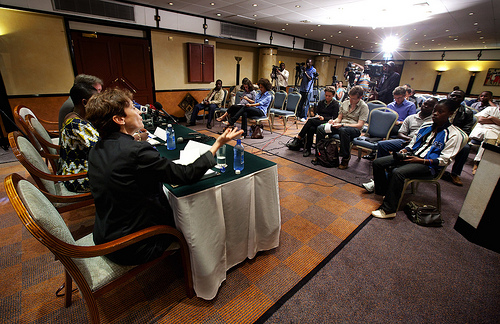
Dominique Strauss-Kahn answers questions on a panel with leaders of civil society organizations, youth groups, teachers, health workers and think tank officials March 7, 2010 in Nairobi, Kenya. IMF Photograph/Stephen Jaffe
The IMF and Civil Society
Global Recovery: Africa is Back
March 10, 2010
The IMF chief is on a trip to Kenya, South Africa, and Zambia to meet political, business, and civil society leaders and assess the impact of the global economic and financial crisis on Africa.
IMF Managing Director Dominique Strauss-Kahn is on his third trip to Africa in 12 months. He told African audiences that there are signs of economic recovery after the global economic meltdown. He also said that the continent’s longer-term challenges include governance issues and climate change.
Strauss-Kahn arrived in Kenya on March 6. He will also visit South Africa and Zambia to reinforce the IMF’s improved relations with the continent, talk with political and business leaders, and promote the continued transformation of Africa.
“As I’ve said many times in the past, African countries were largely innocent victims of the crisis. Thankfully, the tide seems to have turned and all across the continent, we can see signs of a rebound—in trade, export earnings, bank credit, and commercial activity.” Strauss-Kahn told reporters.
In a speech in Nairobi, Kenya, Strauss-Kahn assessed the impact of the global economic and financial crisis on Africa. While noting that the turbulence had struck Africa through many different channels, he said that “all across the continent, we can see signs of life, with rebounds in trade, export earnings, bank credit, and commercial activity.”
The IMF now expects growth of around 4½ percent in 2010. “In short, I think that Africa is back—although a lot depends on a global recovery that is in its early stages.”
Help for developing world on climate change
Strauss-Kahn also drew attention to the challenge of climate change. He called upon the international community to marshal the resources needed to help developing countries, particularly low-income countries, address this issue—which he said could be “the shock to end all shocks.” “Without action, Africa will suffer more from drought, flooding, food shortages, and disease—possibly provoking further instability and conflict,” he added. While “some may rightly argue,” Strauss-Kahn said, “that climate change is not in the mandate of the IMF … the amount of resources needed has clear macroeconomic implications—sustainable growth in developing countries will require large-scale, long-term investments for climate change adaptation and mitigation.”
In this context, he said IMF staff are working on the idea of a “Green Fund” with the capacity to raise $100 billion a year by 2020. He emphasized that while the IMF did not intend to manage such a fund, it aimed to offer something that “can make a significant contribution to the global debate and for consideration by the international community. And now is the time to put new ideas on the table.”
Acknowledging that launching such a scheme would entail a major political effort, he also said that the “potential pay-off is enormous—for Africa and the world.”

Akere Muna, Board Director of Transparency International speaking during a meeting with leaders of civil society organizations, youth groups, teachers and health workers union and think tank officials March 7, 2010 in Nairobi, Kenya. IMF Photograph/Stephen Jaffe

IMF’s Deputy Director of the Strategy, Policy, and Review Department Hugh Bredenkamp (L), IMF's Africa Director Antoinette Sayeh (C) and IMF's External Relations Director Caroline Atkinson (R) attend a press conference on low income countries March 7, 2010 in Nairobi, Kenya. IMF Photograph/Stephen Jaffe
